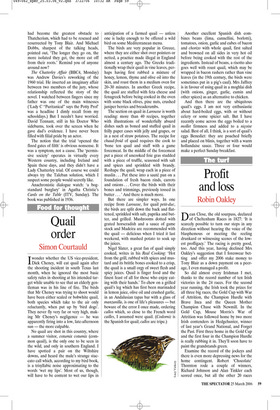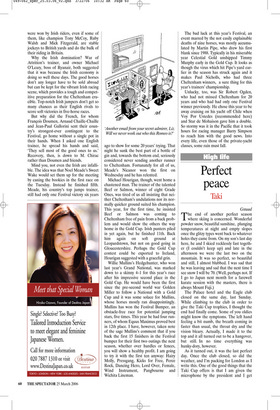Profit and loss
Robin Oakley
Dean Close, the old sourpuss, declared of Cheltenham Races in 1827: ‘It is scarcely possible to turn our steps in any direction without hearing the voice of the blasphemous or meeting the reeling drunkard or witnessing scenes of the lowest profligacy.’ The racing is pretty good, too. And this year, having declined Mrs Oakley’s suggestion that I foreswear betting and offer my 2006 stake money to Tony Blair as a down payment on a peerage, I even managed a profit.
So did almost every Irishman I met, thanks to the record number of ten Irish victories in the 24 races. For the second year running, the Irish took the prizes for all three big races, the Gold Cup with War of Attrition, the Champion Hurdle with Brave Inca and the Queen Mother Champion Chase with Newmill. In the Gold Cup, Mouse Morris’s War of Attrition was followed home by two more Irish contenders in Hedgehunter, winner of last year’s Grand National, and Forget the Past. First three home in the Gold Cup and the first four in the Champion Hurdle is really rubbing it in. They’ll soon have to paint the grandstands green.
Examine the record of the jockeys and there is even more depressing news for the home contingent. Robert ‘Chocolate’ Thornton rode a couple of winners, Richard Johnson and Alan Tinkler each scored once, but all the other 20 races were won by Irish riders, even if some of them, like champion Tony McCoy, Ruby Walsh and Mick Fitzgerald, are stable jockeys to British yards and do the bulk of their riding in Britain.
Why the Irish domination? War of Attrition’s trainer, and owner Michael O’Leary, boss of Ryanair, both suggested that it was because the Irish economy is doing so well these days. The good horses don’t any longer have to be sold abroad but can be kept for the vibrant Irish racing scene, which provides a tough and competitive preparation for the Cheltenham crucible. Top-notch Irish jumpers don’t get so many chances as their English rivals to score soft victories in five-horse races.
But why did the French, for whom François Doumen, Arnaud Chaille-Chaille and Jean-Paul Gallorini sent their country’s strongest-ever contingent to the Festival, go home without a single pot in their hands. When I asked one English trainer, he spread his hands and said, ‘They sell most of the good ones to us.’ Recovery, then, is down to M. Chirac rather than Doumen and friends.
Mind you, not even the Irish are infallible. The idea was that Noel Meade’s Sweet Wake would set them up for the meeting by caning the bookies in the first race on the Tuesday. Instead he finished fifth. Meade, his country’s top jumps trainer, still had only one Festival victory six years ago to show for some 20 years’ trying. That night he sunk the best part of a bottle of gin and, towards the bottom end, seriously considered never sending another runner to Cheltenham. Fortunately for all of us, Meade’s Nicanor won the first on Wednesday and he has relented.
Michael Hourigan, though, went home a chastened man. The trainer of the talented Beef or Salmon, winner of eight Grade Ones, was tired of us all insisting that neither Cheltenham’s undulations nor its normally quicker ground suited his champion. This year, for the first time, he insisted Beef or Salmon was coming to Cheltenham free of pain from a back problem and would show the others the way home in the Gold Cup. Irish punters piled in yet again, but he finished 11th. Back him again on soft ground at Leopardstown, but not on good going in Gloucestershire. Perhaps the Gold Cup contest could be exported to Ireland, Hourigan suggested with a graceful grin.
Willie Mullins’s Hedgehunter, who won last year’s Grand National, was marked down to a skinny 4–1 for this year’s race after his impressive second place in the Gold Cup. He would have been the first since the pre-second world war Golden Miller to follow a National with a Gold Cup and it was some solace for Mullins, whose horses mostly ran disappointingly. Mullins has won the Festival Bumper, an obstacle-free race for potential jumping stars, five times. This year he had four runners, of whom Equus Maximus proved best in 12th place. I have, however, taken note of the sage Mullins’s comment that if you back the first 15 finishers in the Festival bumper for their first two outings the next season, whether over hurdles or fences, you will show a healthy profit. I am going to try it with the first ten anyway: Hairy Molly, Pressgang, Kicks for Free, Perce Rock, Dancing Hero, Lord Over, Female, Wind Instrument, Pangbourne and Wichita Lineman. The bad luck at this year’s Festival, an event marred by the not easily explainable deaths of nine horses, was mostly accumulated by Martin Pipe, who drew his first blank since 1988. Typically in his miserable year Celestial Gold unshipped Timmy Murphy early in the Gold Cup. It looks as though the virus which hit Pipe’s yard earlier in the season has struck again and it makes Paul Nicholls, who had three Cheltenham winners, a sure thing for this year’s trainers’ championship.
Unlucky, too, was Sir Robert Ogden, who had not missed Cheltenham for 20 years and who had had only one Festival winner previously. He chose this year to be away cruising on his yacht off Chile when Voy Por Ustedes (recommended here) and Star de Mohaison gave him a double. So stormy was it in the Pacific that it took hours for racing manager Barry Simpson to reach him with the good news. Into every life, even those of the private-yacht classes, some rain must fall.
























































 Previous page
Previous page